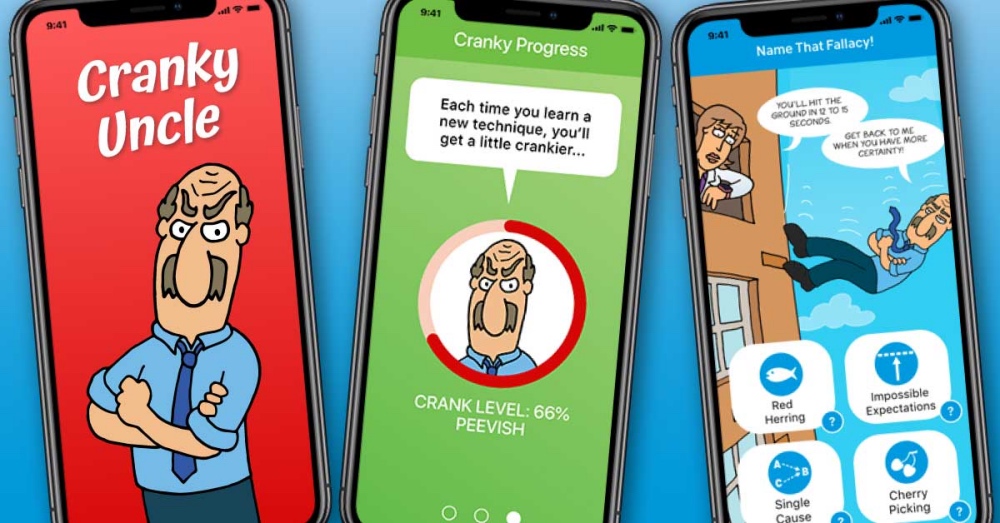London, UK
Thomson Reuters Foundation
When it comes to climate change, deciding what facts you can trust and what’s fake news can be a challenge, particularly in an era of sophisticated misinformation campaigns and complex scientific data.
But an ally is at hand: ‘Cranky Uncle’, a gruff cartoon character and denier of climate change facts who, in a new game, helps you master the art of creating global warming disinformation – and makes you better at identifying it in the real world.

An illustration from the ‘Cranky Uncle’ game being developed by John Cook, an assistant professor at George Mason University in Virginia. PICTURE: Thomson Reuters Foundation/John Cook
From the use of fake experts to cherry-picking data, “you learn the techniques and then you’re able to spot them yourself,” said John Cook, an assistant professor at Virginia’s George Mason University and one of the creators of the online game.
In one scenario, for instance, Cranky Uncle is falling, unconcerned, from a tall building while a white-coat-clad scientist leans out a window, warning he’ll hit the ground in 12 to 15 seconds.
“Get back to me when you have more certainty!” Cranky Uncle demands.
Such “impossible expectations” for predictions are one way of trying to undermine scientific data, the game notes, alongside techniques such as logical fallacies.
In one of those, Cranky Uncle insists that a boat he’s in can’t be sinking – despite the stern being underwater – because the prow, where he’s standing, is still rising out of the water as the vessel, Titanic-style, becomes vertical.
The idea, Cook said, is essentially to “innoculate” users against climate change disinformation and misinformation they might encounter by purposely exposing them to a small dose of it.
“It basically stops misinformation from spreading, from people passing it on,” said Cook, a climate change communications expert born in Australia and now working in the United States.
Both countries, he said, are widely seen as strongholds of climate denialism – alongside Canada and the United Kingdom – despite evidence of worsening droughts, wildfires, floods and storms.
The idea for the game – currently still a prototype – comes from work by Sander van der Linden, a social psychologist at the University of Cambridge, who in 2018, with researcher Jon Roozenbeek, created Bad News, a game designed to help players identify fake news by learning how to create it.
That online game, so far played by about a million people in 15 languages, “is non-political and non-judgmental. It gives people an environment to learn about these techniques regardless of what your prior views are,” van der Linden said.
Now ‘Cranky Uncle’ “is using the same techniques that worked for us. It’s kind of silly and people can relate to it.”
Cook, who has a background in drawing cartoons, said one of the appeals of Cranky Uncle is that most people have run into a character like him.
That’s particularly true in the United States where just under 10% of the people say they are sure climate change is not happening and actively oppose action to reduce emissions, according to research published by Yale University.
“Just about everybody says, ‘I’ve got an uncle just like this’. I think it’s almost a universal human condition,” Cook said.
He hopes to raise $15,000, in part through crowdfunding, to turn the prototype – tested in university classes on the U.S. East Coast – into a phone app and launch it mid-2020.
He said initial reactions from students have been largely positive, with many saying they had fun, and felt they could now better see through attempts to mislead them – and not just about climate change.
“We found that playing this game about climate disinformation innoculated them against any kind of misinformation,” he said.






